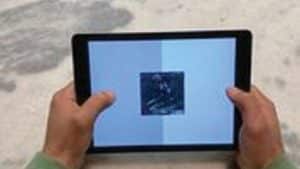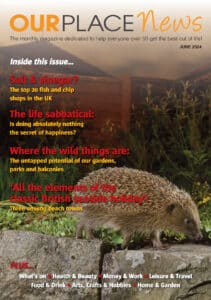Medics say the app could soon be used as the basis for a nationwide dementia screening programme.

Inews reports that the NHS has introduced a revolutionary new app to help diagnose Alzheimer’s Disease.
It takes only five minutes to complete and is more accurate than established pen-and-paper tests.
The test is currently done on iPads at a general practice or hospital ward but it could soon be conducted at home on a smart phone – paving the way for the nation’s first widespread screening programme for Alzheimer’s and other forms of dementia within the next few years.
It is hoped it will identify people at high-risk of developing the disease up to 15 years before symptoms appear, so that steps can be taken to slow its progression.
The test uses artificial intelligence to assess a person’s brain function by showing them large numbers of black and white photographs and asking them to identify which ones contain an animal.
The images appear for a split second – some obviously show an animal, while in other cases its presence is less obvious or there is no creature there at all.
Animals are used because they elicit strong reactions in people giving a greater insight into brain activity.
The test can identify differences in reaction speed and accuracy that become evident long before the memory loss that current tests focus on.
It was created by two Cambridge University PhD graduates, through their company, Cognetivity, and has been approved by the UK’s Medicines and Healthcare Products Regulatory Agency (MHRA).
“The test provides a unique way of screening for cognitive impairment which can be used across the population. In a best case scenario, I think we could see population-wide screening within the next year – and in a worst case, five years,” Cognetivity co-founder Seyed-Mahdi Khaligh-Razavi, told i.
“And with a variety of promising new drugs to treat early stage Alzheimer’s in advanced clinical trials, a screening programme to identify those at high risk is especially timely. The disease can’t be reversed but if you detect it early you have more chance to stop it,”
he said.
Nearly a million people in the UK have dementia, costing the NHS, social care services and households an estimated £26 billion a year in care – meaning that early detection and treatment could save billions of pounds a year, experts say.
The North Staffordshire NHS trust and the Sunderland GP alliance of 35 practices have just started using the app to help monitor and diagnose patients with suspected dementia.
These trusts represent a population of about 750,000 between them while several other NHS trusts are in discussions about using the app with Cognetivity, which appointed former NHS England deputy chairman to help expand the business last week.
The Sussex Partnership NHS Trust has started a remote trial of the app at people’s homes that is backed by the government and involves Alzheimer’s Research UK.
A scientific paper that has just been finished and is going through the peer review process ahead of publication finds that the app is 84.2 per cent accurate at identifying people who are cognitively impaired – compared to 81.6 per cent for the standard MoCA test.
It is expected to become even more effective as the AI programme processes more data.
Because the test involves images rather than language, it is not subject to the linguistic or cultural biases of existing tests – and can use different images each time.
This means it can used over and over again to monitor development over time – whereas existing tests can be learned, so become less effective, advocates argue.
The images are all black and white for two reasons so there is no disadvantage with people who are colour blind and to remove the clues found in colour, such as the orangey-red colour of a fox.
Reaction to the new app
The medical community has strongly welcomed a new AI test for dementia that could soon be used to screen the nation – something that is not possible now because it would be far too expensive.
“This test offers an, until-now, unavailable opportunity to detect cognitive change in ageing adults remotely and at scale – opening the possibility for screening programmes,” said Oxford University’s Ivan Koychev, who is a senior adviser to Dementias Platform UK, a Medical Research Council project to speed up detection of the disease.
Dr Susan Michell, head of policy at Alzheimer’s Research UK, added: “For decades, doctors have had to rely heavily on pen-and-paper assessments and brain scans to support a dementia diagnosis. This test is accessible, simple to do, and can identify people at an earlier stage than current techniques.”
“Current diagnostic approaches can be expensive and invasive, and we urgently need new tools that can identify these diseases early,
accurately and cost-effectively,” she said.
“Identifying Alzheimer’s early will allow people to access support and current treatments sooner, get involved in research and help trial emerging new treatments at a stage when they’re likely to have the greatest benefit,” Dr Mitchell added.
Dr Rebecca Chubb, who is in charge of older people’s services at the North Staffordshire NHS Trust and has just started using the app, said: “We’re very excited by the potential of the test to drive improvements in how we assess our patients in the dementia pathway. This is a fantastic piece of innovation that could one day be used in clinics up and down the country.”
Jon Twelves, Chief Executive of the Sunderland GP Alliance, which is also using the app, added: “We see huge potential for this to improve clinical outcomes for patients experiencing cognitive decline. Desirable as monitoring patients with mild cognitive impairment may be, it has simply not been practical without the efficiency and objectivity of this test which could have a massive benefit in tackling a major global healthcare problem like dementia.”
Dr Zahra Vahabi, head of the geriatric ward at the Tehran University of Medical Sciences, has been piloting the test in Iran for the past year. He said: “This is a simple, yet accurate, tapping test, which makes it easy for various groups (such as poorly educated people) to understand. And it is very quick and easy to administer. These characteristics make it an ideal candidate for population wide screening of cognitive function.”
How early detection can help manage the disease
There is no cure for Alzheimer’s but there are things that can be done to slow progression of the disease – and the sooner this begins the more successfully symptoms can be managed.
At the moment, the steps that can be taken are much more to do with lifestyle than drugs, with plenty of exercise, a good diet and lots of sleep at regular times.
But hopes are mounting that very soon, the first drugs that can slow, or even halt, progression of the disease could become available on the NHS. These drugs would be a gamechanger – especially if cases of dementia were picked up very early, giving the drugs plenty of time to work.
The US Food and Drugs Administration is expected to due to rule by June 7th on whether the most advanced of these drugs can be used in clinical practice – with the UK and Europe expected to follow suit shortly afterwards.
The drug, known as aducanumab, works by helping to untangle clumps of plaque in the brain and could be the first to slow, or even halt, disease progression.
Trials have found that patients given the drug saw improvements in their language skills and ability to keep track of time and place, with a slower loss of memory.
Currently, drugs to help those with dementia can only mask symptoms and it is almost two decades since these sorts of medicines have been approved.
Dr Susan Mitchell, Head of Policy, at Alzheimer’s Research UK said: “We need the tools to identify diseases like Alzheimer’s years before symptoms start and people’s lives become severely affected.”
“When symptoms like memory loss become apparent, diseases like Alzheimer’s can have already taken hold and have potentially been developing in the brain for up to two decades,” she said.
The app could also be used to identify multiple sclerosis years early
The app test that has been developed for dementia could also be used to detect signs of multiple sclerosis (MS) years before symptoms begin to appear, researchers claim.
Uses of the test for MS are not as far advanced as they are for dementia but the app offers considerable potential for both types of disease, they say.
Cognitive impairment is common in MS patients meaning that signs of the condition can be detected by the test in a similar way to Alzheimer’s, according to Dr Masood Nabavi, of the Royal Institute for Stem Cell Biology and Technology in Iran.
He conducted a study, published in the journal BMC Neurology, which found the test could distinguish between ‘cognitively normal’ and ‘cognitively impaired’ patients with 95 per cent accuracy.
“The test has the potential to be used as a marker of cognitive impairment in multiple sclerosis and to monitor response to therapy. In comparison to currently standard cognitive tools for MS, this is easier to adopt in clinical practice given that it doesn’t need a clinician to administer the test, it takes only a few minutes to complete and can be engaging for patients given it is ‘gamified’,” Dr Nabavi said.
Dr Sina Habibi, chief executive of Cognetivity, which makes the tests, said: “Our technology is capable of revealing underlying physical damage to brain cells without the need for any invasive measurement such as blood or spinal fluid sampling. It represents a major development for clinicians tasked with reliably detecting and regularly monitoring cognitive ability in MS patients in order to direct the most effective treatment to sufferers.”
“Cognitive impairment is increasingly recognised to be an important feature of MS. We have the potential to bring about a new paradigm in monitoring the progression and treatment of MS in clinical care, and the development of novel drugs through clinical trials. We encourage physicians and researchers to come forward and partner with us to make the most of this powerful tool,” he said.
(Story source: Inews)

